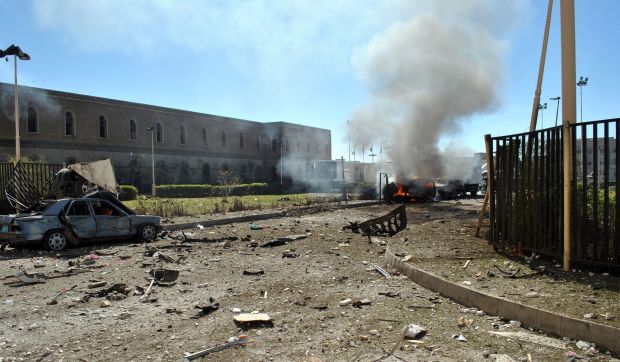Yemen has long been and will continue to be a security concern for the Gulf Cooperation Council (GCC). The international community, led by the GCC, intervened to prevent possible state collapse in 2011. GCC governments played a crucial role in negotiating the political transition in Yemen—it is popularly known as the “GCC deal.” GCC officials have supported the national dialogue to create a more inclusive political system, and the restructuring of the armed and security forces so that they owe allegiance to the state and not powerful individuals. GCC states are by far the greatest contributor to the billions of dollars promised for economic development and humanitarian relief.
The international community’s involvement in Yemen is driven in large part by the need to deal with the threat posed by Al-Qaeda in the Arabian Peninsula (AQAP). The scale of the AQAP threat to Yemen is shown by the way it exploited the political conflict within the regime in 2011 to seize towns in Abyan. Its fighters were driven out, but they continue to operate in smaller groups. AQAP is pursuing a strategy of steady attrition against security officials and has ambitions to attack economic facilities. Western governments assess AQAP as the most dangerous of the Al-Qaeda offshoots. It has the ambitions to attack targets in the GCC and beyond: at least three such attacks are known to have been frustrated since 2009. The use of propaganda techniques developed by Anwar Al-Awlaki have inspired terrorist attacks in the West. AQAP must be defeated in Yemen before it can enhance its capacity to launch new attacks beyond Yemen’s borders. The GCC has learned from experience that the best way of fighting terrorism is to give people a strong stake in the status quo. Saudi Arabia’s use of persuasion and rehabilitation to deal with Al-Qaeda is widely seen as a model of counter-terrorism. The GCC and its allies will need to put even more resources into helping Yemenis to reform their political and security structures and to alleviate the poverty and deprivation that can potentially drive people into the arms of extremists.
Yemen, which will have 30 million people by the early 2020s, cannot be allowed to remain an area of deep poverty in a peninsula that is so wealthy: 10 million Yemenis do not get enough to eat. Most international indices measuring human development put Yemen near the bottom. Youth unemployment is unacceptably high. The oil and gas revenues that have sustained Yemen—or at least its elites—are in rapid decline, and the security situation deters new exploration. Parts of the country will run out of water in the next 10 to 20 years. Unless something is done, Yemen’s problems will only get worse and create an even bigger security problem for the GCC.
The GCC will thus maintain its active role in helping Yemenis with the transition process by persuading all parties to make the necessary compromises and deter those powerful figures from the past who want to wreck it. Any new system will not be viable unless it can deal with the grievances and aspirations of the South and ensure that solutions are found to end the conflicts in Saada and its surrounding governorate—which spilled briefly into Saudi Arabia in 2009 and 2010. The restructured security forces must protect the state, but will need additional support to deal with AQAP.
GCC countries for many years have been generous in their support of Yemen. They can now play the major role in creating the jobs that Yemenis so desperately need. Governments want to ensure that their money goes to those who need it and is not siphoned off by the elite networks or simply absorbed by the bureaucracy.
Many Yemenis want their country to become a full part of the GCC and not just a member of some committees. They want access to employment and aspire to the high living standards enjoyed by most GCC citizens. The GCC is understandably reluctant to admit such a populous new member with so many problems. But it is in the long-term interests of its current members to help the Yemeni government to provide jobs and opportunities through support for the economy and encouraging GCC companies—and not just those set up by businessmen of Yemeni origin—to invest in Yemen. This may require some preliminary assistance in creating the conditions that will encourage investment: transparency in decision-making, and judicial and other oversight systems that can be trusted. GCC governments and companies can enhance the education in Yemen so that all Yemenis, including women, can acquire the skills that both Yemen and the GCC need.
Yemen has traveled a long way since early 2011, but it has an even longer and harder road ahead. The GCC is in the best position to help, since by doing so it will prevent Yemen becoming not merely a security concern, but the source of a security threat.
The counterpoint to this piece can be read here.
